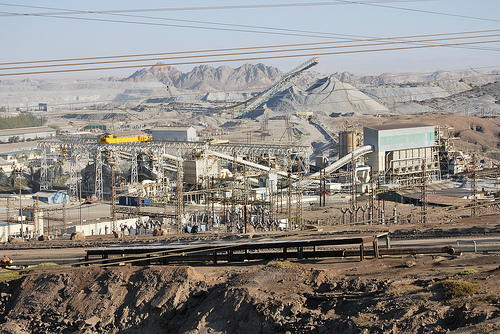
Uranium workers Namibia unaware of severe health risks
Uranium workers in Namibia still fear for their health and lifestyle due to the environmental impact of uranium mining while concessions for mine companies continue to be granted by the government.
Uranium workers in Namibia still fear for their health and lifestyle due to the environmental impact of uranium mining while concessions for mine companies continue to be granted by the government. This is the conclusion of the recently published report ‘Uranium mining in Namibia – the mystery behind low-level radiation‘ by the Namibian research Institute LaRRI, in co-operation with SOMO. This week LaRRI director Hilma Shindondola is on tour in the Netherlands and Europe to share her homelands experience with a wider network.
The research was conducted into the environmental, labour and human rights conditions at Namibia’s largest uranium mine: Rössing Uranium (Rio Tinto Group). 50 current and former workers at the mine were interviewed. Mine workers and others in the surrounding communities inhale dust and radon gas. The radon gas exposes the body to alpha radiation, which is destructive. Exposure to radiation is most often associated with cancer, but it can also have other harmful effects. Low level radiation can contribute to birth defects, high infant mortality and chronic lung, eye, skin and reproductive illnesses.
According to Hilma Shindondola-Mote, Director of LaRRI, uranium mine workers are not aware about the true nature of their health status: “During the time we conducted the study, employees claimed that Rössing does not explain what health problems can arise from exposure to uranium”. Shindondola-Mote said further said that workers of the company raised concern that although they are tested annually, the results are never revealed until such a time when they leave the company. “The workers feel that there is a conspiracy between the doctors and Rössing. They are only informed about health problems like cancer after leaving their jobs. The doctors tell them that the deterioration in their health is because of their genes, family history or lifestyle.”
Based on the results of that research SOMO, LaRRI and Earthlife Namibia conducted a series of workshops in Namibia to raise awareness on the potential environmental and human rights impacts of uranium mines. The workshops took place from 27 till 30 October 2008 in the capital Windhoek and in the mining communities of Arandis and Swakopmund. The aim of the workshops was to ask attention for the impacts of uranium mining in communities where new uranium mines are being explored and planned.
Many new uranium mines are currently being planned and explored in Namibia. Since Namibia has no domestic demand for uranium, 100% will be exported to Europe, the United States, South Africa and China. Uranium is primarily used to fuel nuclear power plants, but can also be used to make nuclear weapons. Approximately 15% of Rössing’s uranium is processed in Europe. The Netherlands, with one of the few uranium enrichment plants in Europe, has almost certainly handled and processed Namibian uranium.
SOMO and LaRRI’s study on uranium mining in Namibia is currently being shared with and incorporated into international campaigns and networks aimed at improving working and environmental conditions around uranium mines. Awareness raising activities based on the research results are taking place to inform potentially affected communities. In 2009, SOMO will continue to investigate the environmental health and safety conditions among workers in uranium mines in Namibia, as well as examining the links between multinational uranium mining companies and the governments they sign mining deals with
Uranium mining in Namibia
This video shows the negative consequences of uranium mining for workers and communities in Namibia.
Related news
-
 Civil society organisations push for transformative global investment rulesPosted in category:News
Civil society organisations push for transformative global investment rulesPosted in category:News Bart-Jaap VerbeekPublished on:
Bart-Jaap VerbeekPublished on: -
 The Counter: strengthening the fight for climate justice around the worldPosted in category:Long read
The Counter: strengthening the fight for climate justice around the worldPosted in category:Long read Luis ScungioPublished on:
Luis ScungioPublished on: -


